We are thrilled to feature new voices and new perspectives, many from people who are posting for the first time in English. Their voices have been missing from the conversation about gender and Mormonism, and their posts highlight the diverse experiences of LDS women throughout the global church.
Today’s post comes from Dave Dixon. Dave is the co-founder of No Poor Among Them, a podcast/blog devoted to exploring ways in which we as Latter-day Saints can eliminate poverty in the Church and in the world. He is also a board member for the Liahona Children’s Foundation, the happy husband of Jana, and happy father of two sons.
As the sun shines brightly over the city of Lugazi, Uganda, around 21 women are busily making hand-crafted jewelry for Musana Jewelry. All told, these artisans support themselves and 108 children. Melissa Sevy, Rebecca Burgon, and Kristen Wade are pleased with the progress the organization has made. Musana (which means “sunlight” in the local language of Luganda) was formed by these after seeing the difficulties of these women on a humanitarian trip to the area in 2009. The organization has since blossomed, and has helped many local women to flourish. I spoke with two of them: Tina and Harriet. The business is run locally by Tina, a local LDS primary president. Harriet, a hard-working artisan told me that working for Musana has enabled her to better provide for her children and allows her to receive proper medical care for issues resulting from HIV. Many of the local artisans are single mothers who have had a very difficult time in their lives. Musana not only provides employment for these women, but also trains them with classes in literacy, English, finance, business, and health. These women have ambitions to start their own businesses when they feel they are on solid enough footing, thus allowing other women to enter Musana’s business training program. Melissa told me in an interview that focusing on women is the key to economic development. When you pay a woman or a girl, they reinvest 90 percent of their income in their families, compared to 30-40 percent for men. Musana does a great job of connecting women all around the world. My wife Jana hosted a Musana market in her home, in which friends and neighbors bought some of the hand-crafted jewelry, watched a specialized thank-you video from the artisans of Musana, listened to Ugandan music, and ate some awesome Ugandan food (the peanut butter stew was really good).
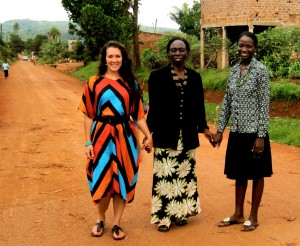
Suzy Benson Gillies was drawn to the people of Northern Uganda after learning about the terrible things the Lord’s Resistance Army had done during a brutal civil war there. When the war was over, Suzy knew she had to go to the people and try to make a difference. She told me, “So many times, our blinders prevent us from seeing the need to serve globally. We do so much service in the church for our own people and leave it to the big guys in Salt Lake to take care of the world’s poor. That is not enough. I believe the Savior requires us to care for the least of these in a bigger way than writing our tithing check each month.” A self-identified “soccer mom,” Suzy writes that when she initially went, caring for orphaned youth, she noticed that many of the young girls were left to fetch water while the boys had opportunities for education and recreation, including soccer. Upon her return to Uganda, Suzy brought along a girls soccer team to promote and health and education among Ugandan women. While there, she came across an old man named Tiger. He asked angrily why Americans like her and her soccer team had not seen the suffering of his people. Suzy promised Tiger she would not forget, but would tell the American people about the suffering of the people of Northern Uganda. The African Promise Foundation was the result. Like Musana, those served by the foundation make beautiful hand-crafted jewelry to sell at a profit in U.S. markets. These proceeds provide sponsorships for needy and orphaned children.
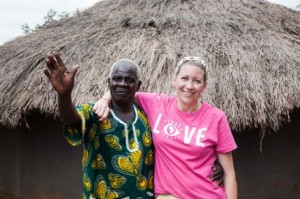
The foundation also connects individuals wanting to sponsor Ugandan youth to provide school costs at around $35/month. The Africa Promise Foundation also travels to Northern Uganda regularly, allowing participants to dig wells, bring menstrual kits to young women who otherwise could not attend school during their period. Suzy feels called to help others see there is something bigger than them in the world.
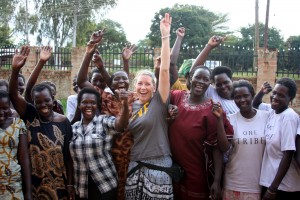
While working with the United Nations in a Burmese refugee camp, it became clear to Dana Allison that when a mother lost her life during or related to childbirth, it not only devastated her family, but also her community. Many of the key development challenges – poverty, hunger, child mortality, and lack of education – are improved if the mother is present in the home. So Dana felt compelled to help pregnant and postpartum women in Senegal survive childbirth, starting the Women’s World Health Initiative. Roughly 350,000 women die each year from pregnancy and childbirth related complications. Most of these deaths occur in low-income countries and specifically in poor and rural areas, such as the places Dana works in Senegal. To alleviate the likelihood of death during pregnancy or childbirth, Dana sets up sustainable healthcare delivery systems that are ultimately funded and maintained by local communities. To do this, WWHI trains local midwives and community health workers, incorporates cutting-edge technology to increase access to good health care, and integrates economic incentives to ensure the sustainability of the program. This is yet another example of Latter-day Saint women helping those with acute needs throughout the world.
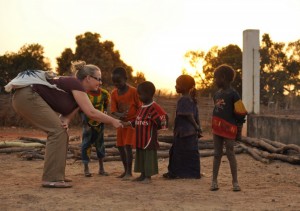
Roughly 120,000 Latter-day Saint children below the age of 12 suffer from malnutrition to one degree or another. The effects of malnutrition make it difficult for these kids to become self-sufficient in life due to the impacts on cognitive and physical growth. Gloria Thelma Perez Delgado Rosales, a native Guatemalan, works with the Liahona Children’s Foundation to provide nutritional supplements to many of the children in local stakes and districts. She is seemingly indefatigable in her care for these kids. North Americans who have gone down to witness this problem in the church for themselves can attest to the passion she has to care for these kids. Gloria receives a small stipend from the foundation to accomplish her work, but the work she does is much greater than what she receives in compensation. In an essay in the Wall Street Journal, Matt Ridley asserts that in some ways, we know what gets results in international development. He suggests one of the most efficient ways to do this is to reduce malnutrition, writing that “when children get better food, they develop their brains, stay in school longer and end up becoming far more productive members of society. Every dollar spent to alleviate malnutrition brings $59 of benefits.” Gloria is one of many committed local coordinators with the Liahona Children’s Foundation. Almost without exception, these coordinators are women, and are doing tremendous things to raise the future leadership of the Church. Nigerian Latter-day Saint Olukunbi Orimoloye is another example. After seeing a plea to help the children of the Juba, South Sudan branch on a Facebook group, I reached out to ‘Kunbi on Facebook as a board member of the Liahona Children’s Foundation to see what could be done. ‘Kunbi was stationed in Juba for her job with the United Nations and taught primary when she attended the local branch. She, along with the help of a missionary couple, set up screenings for the children there. The situation was very bad. Just as we were trying to figure out how to get nutritional supplements to these children, a civil war broke out in South Sudan, many members of the branch were scattered, and the branch was closed. We currently have no way of knowing where these kids are or how they are doing.
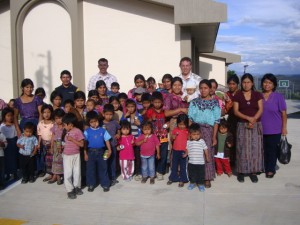
Perhaps the stories of women up-and-starting foundations seem a little out of reach for you? Me too. For many Latter-day Saint women, alleviating poverty means volunteering for charities or donating to worthy causes. For the past year and a bit, my wife Jana Taylor Dixon has baked bread to provide financial support for a former street child in Ethiopia named Mamo and for Daphnee, an orphan in Haiti. Chante King uses her vacation days to go on humanitarian trips with various organizations. Many others set aside what they can from their modest incomes and donate to organizations doing this important work.
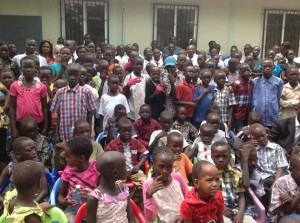
There is a tremendous need for Latter-day Saint men and women across the world to see beyond their local congregations and succor those in need throughout the world. It’s time to go beyond making casseroles and helping people move, though we have recently been the beneficiary of both and are extremely grateful for the help. During the first ever Relief Society meeting, President Emma Smith remarked that the society would “seek out and relieve the distressed.” And when asked what the object of the society was, she replied that it was “for charitable purposes.”
As the world continues to metaphorically shrink because of technological advancements, the women of the church have a great opportunity to “seek out and relieve the distressed.” I have been greatly inspired by the women mentioned above, and many others, who are working tirelessly to do just that.


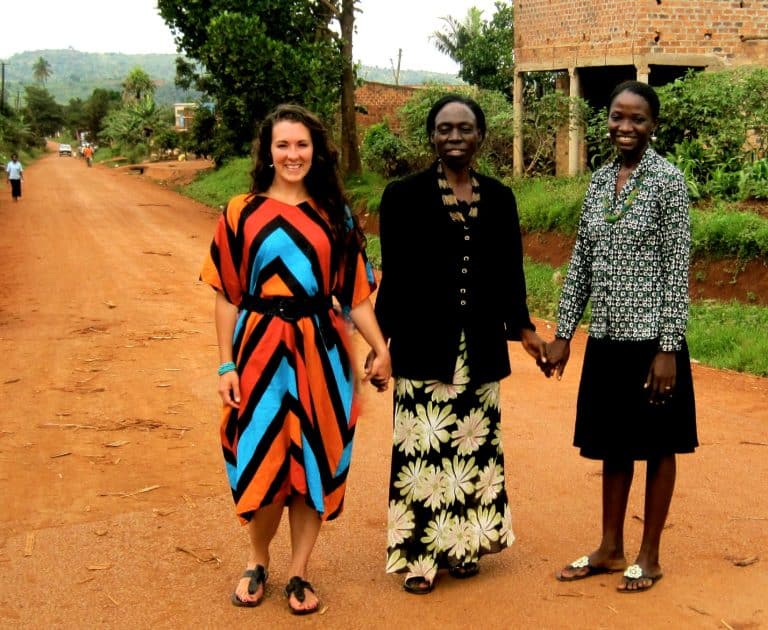
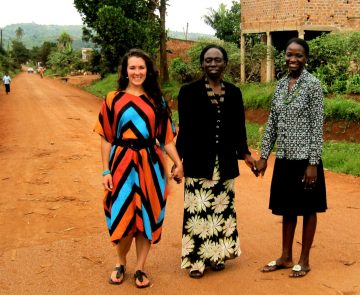


11 Responses
[…] As the sun shines brightly over the city of Lugazi, Uganda, around 21 women are busily making hand-crafted jewelry for Musana Jewelry. All told, these artisans support themselves and 108 children. Melissa Sevy, Rebecca Burgon, and Kristen Wade are pleased with the progress the organization has made. Musana (which means “sunlight” in the local language of Luganda) was formed by these after seeing the difficulties of these women on a humanitarian trip to the area in 2009. The organization has since blossomed, and has helped many local women to flourish. I spoke …read more […]
This is an important post, Dave, i am very grateful that you shared it here!
Its funny, your last paragraph was uncomfortable for me to read. After thinking about it, I think my discomfort comes from your connecting this work to the relief society, and yet, these groups and foundations are independant of the relief society; the irony screamed at me that *because* the relief society is a group for women that is led by men, we have to gain permission from male leaders to do the service you write about, because it is out of the “boundaries” that entrap the ability of Mormon women to serve the women of the world via the vehicle of the relief society. Thus, the ability of the male-led women’s group is limited in its “sphere.” And yet…. Because Mormon women (and men) have the integrity and drive to serve, it is almost -in spite- of the administrative structure that we seek to and do serve, in a truly Christlike manner.
Thank you for remaining us to tap into our desire to serve, and for directing us to examples of women who stepped up and out to truly do something extraordinarily benevolent.
Spunky,
Great observations. You’re right, I should have been more careful about connecting the Relief Society with these women who simply choose to act on their own volition when they saw a need. I think what I wanted to do more than anything was to connect these inspiring women with other inspiring Mormon women from the past.
For those who are wealthy enough to travel around the world offering humanitarian assistance (and many in my ward do), it’s a lovely opportunity. For most of us that’s unrealistic. We will just have to be limited to being charitable in our own neighborhoods, and hope that the Lord accepts our service equally with those who are able to jet their whole family down to Guatemala to build houses for the poor. My casserole or my loaf of bread is my widow’s mite and should not be disparaged by those who have means to render global service.
Every kind word and action is important. Every service is acceptable to the Lord. Never doubt that.
Alison,
I hope my post didn’t come across in that way. I have often been the recipient of such service and am profoundly grateful for it. I only wanted to stress the dire circumstances that over a billion people find themselves in every day. I have never been able to go on a humanitarian trip due to cost as well, but I try to do what I can from a distance.
Dave, I love this post. I think that recognizing and helping our global sisters is a huge part of claiming the power of the original Relief Society – we don’t need to ask, we just need to help. And I think we can do that in so many ways. I disagree that those without financial means can’t help internationally – there are so many ways to contribute to causes helping our international sisters without flying our entire families around the world, or even ourselves. I tend to think that we just need to recognize and use whatever resources we have, whether it’s time, money, connections, or whatever. We have so much work to do, and recognizing this global sisterhood is a huge step.
I wish we had better ways for RS sisters to network with each other. We have many opportunities to help women in our own wards, but there are so many women out there who need help.
I’d love it if part of donations to fast offerings were distributed by the RS, or if there were a similar fund set up.. I would happily fast another day each month and donate the money I saved to a fund like that.
Amira – this idea gave me chills. I wonder if there’s a way to do this even if it’s not through the church – could we have women who are interested participate in something like this and then donate to an agreed-upon cause, whether it’s something like the LDS Humanitarian fund, Women for Women International, or Thrive Gulu (a non-profit started and run by Exponent II founding mother Judy Dushku)?
Do you mind adding this idea to the open thread so that more people see it?? I love this idea.
Sure, I’ll add a comment there.
I think there are a lot of excellent charities out there, but I’d especially like to see a way to get money to people who see a specific need at a specific time. For example, I have a friend in Central Asia who has experience working for other humanitarian programs, but she also knows of smaller, one-time needs that only cost a few hundred dollars that she doesn’t have. I’m sure that a lot of the women who’ve posted over the last two weeks, and many other LDS women living all over the world, would have ideas for very small projects like this.
There are, of course, problems with oversight and potential corruption in grass-roots projects like that, but there is also potential to help people who are overlooked. I don’t know if it would work or not.
Great post! I love to hear about the great work people are doing in other countries to relieve poverty and sorrow. I am grateful to those people because travelling abroad and setting up foundations is not something I can do right now in my life, but I can support and donate to those foundations. I am glad that others have taken the time and energy to go and determine the needs of others. I agree with you that while we need to take care of our own, we also need to broaden our efforts and help people beyond our borders. We have a bigger capacity to do this than we sometimes think we do.